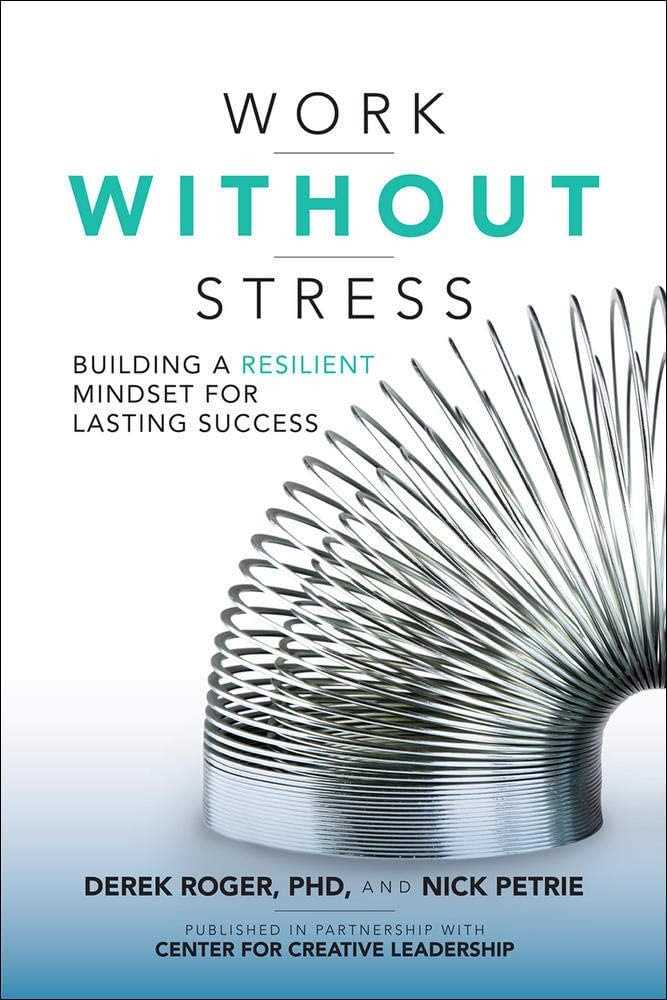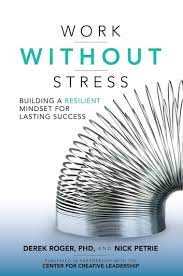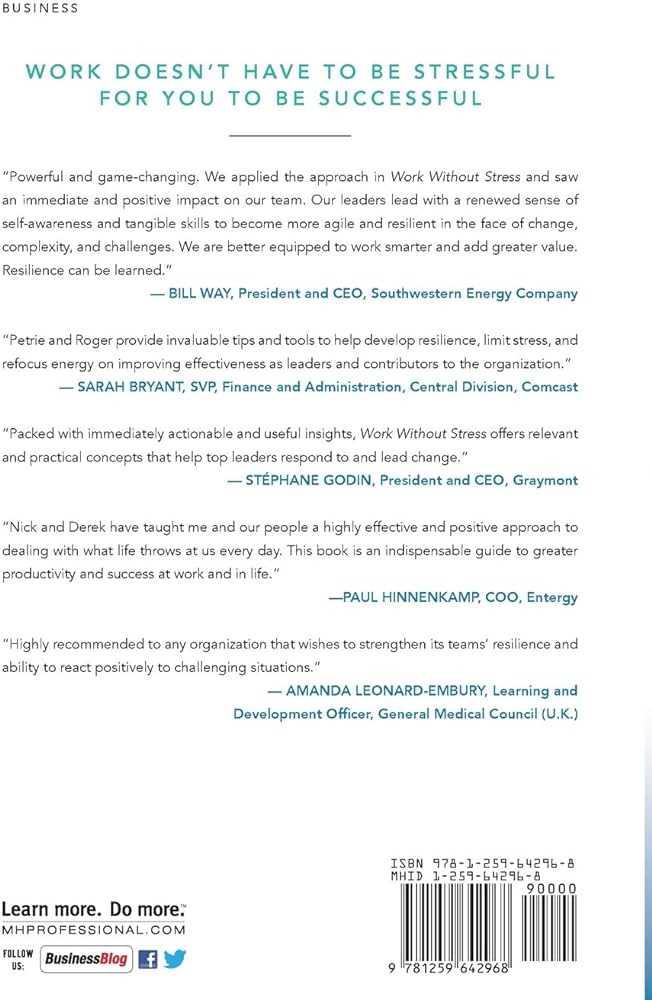
In today’s fast-paced and competitive world, it’s easy to get overwhelmed and stressed out. However, with the right mindset, you can build resilience and achieve lasting success without succumbing to stress. Building a resilient mindset is all about cultivating a positive and adaptable attitude towards challenges and setbacks.
Working without stress starts with understanding that stress is not an inevitable part of the job. It’s a mindset that can be changed and managed. By developing a resilient mindset, you can learn to navigate through difficult situations without letting stress hinder your progress.
A resilient mindset involves recognizing and reframing negative thoughts and beliefs. Instead of viewing setbacks as failures, a resilient mindset sees them as opportunities for growth and learning. It’s about embracing challenges and using them as stepping stones towards success.
Resilience also requires taking care of your physical and mental well-being. This means prioritizing self-care activities like exercise, healthy eating, and getting enough sleep. Taking breaks and practicing relaxation techniques, such as deep breathing and meditation, can also help reduce stress levels.
Ultimately, building a resilient mindset is an ongoing process that requires practice and self-reflection. By adopting a positive attitude, reframing negative thoughts, and taking care of your well-being, you can work without stress and achieve lasting success in all areas of your life.
Understanding the Importance of Resilience

Resilience is a crucial factor in achieving lasting success without succumbing to stress in the workplace. Building a resilient mindset is essential for navigating the challenges that come with work and maintaining a healthy work-life balance.
Resilience refers to the ability to bounce back from setbacks, adapt to change, and maintain a positive outlook. It is not about avoiding stress altogether, but rather about developing the skills and mindset to effectively manage and overcome it.
Without resilience, work can become overwhelming, leading to burnout and decreased productivity. Resilience allows individuals to remain focused and motivated, even in the face of adversity.
Building resilience involves developing a range of skills, such as self-awareness, emotional intelligence, and problem-solving abilities. It also requires cultivating a support system and seeking help when needed.
Resilience is not something that comes naturally to everyone, but it can be learned and developed over time. It requires self-reflection, practice, and a willingness to embrace challenges and learn from failures.
A resilient mindset can have a profound impact on both professional and personal success. It enables individuals to approach work with a sense of optimism and confidence, even in the face of setbacks or difficult circumstances.
Overall, understanding the importance of resilience is crucial for building a successful and fulfilling career. By developing resilience, individuals can work without stress, overcome obstacles, and achieve lasting success in their chosen field.
Developing Mental Strength

Building a resilient mindset is crucial for lasting success. In today’s fast-paced world, stress is a common factor that can hinder our ability to achieve our goals. However, by developing mental strength, we can learn to work without stress and overcome any obstacles that come our way.
Mental strength is the ability to stay focused, positive, and motivated, even in the face of challenges. It involves developing a strong mindset that allows us to adapt to change, embrace failures as learning opportunities, and maintain a sense of calmness in stressful situations.
One way to develop mental strength is by practicing mindfulness and meditation. These techniques can help us become more aware of our thoughts and emotions, allowing us to better manage them. By practicing mindfulness, we can learn to let go of negative thoughts and replace them with positive ones, ultimately reducing stress and improving our overall well-being.
Another important aspect of developing mental strength is self-care. Taking care of ourselves physically, mentally, and emotionally is essential for maintaining a resilient mindset. This can include getting enough sleep, eating a balanced diet, exercising regularly, and engaging in activities that bring us joy and relaxation.
In addition, surrounding ourselves with a supportive network of friends, family, and mentors can also contribute to our mental strength. Having a strong support system can provide us with the encouragement and guidance we need to overcome challenges and achieve success.
Finally, it’s important to remember that building mental strength is a continuous process. It requires consistent effort and practice. By incorporating these strategies into our daily lives, we can develop the mental strength needed to work without stress and achieve lasting success.
Overcoming Challenges
Building a resilient mindset is essential for overcoming challenges and working without stress. When faced with difficult situations, it is important to approach them with a positive and determined attitude. By maintaining a resilient mindset, individuals can navigate through obstacles and setbacks with grace and perseverance.
One key aspect of overcoming challenges is managing stress. Stress can be a major hindrance to success and can easily derail individuals from their goals. By developing techniques and strategies for managing stress, individuals can build a strong foundation for lasting success.
Another important factor in overcoming challenges is developing effective problem-solving skills. When faced with a challenge, it is important to analyze the situation, identify potential solutions, and take action. By approaching challenges in a systematic and logical manner, individuals can increase their chances of finding successful resolutions.
Additionally, building a support network can greatly contribute to overcoming challenges. Surrounding oneself with positive and supportive individuals can provide encouragement and motivation during difficult times. Having a strong support network can also provide valuable insights and perspectives that can help in finding solutions to challenges.
Lastly, it is important to remember that overcoming challenges is a continuous process. Challenges will inevitably arise throughout life, and it is important to approach them as opportunities for growth and learning. By maintaining a resilient mindset and continuously working towards personal and professional development, individuals can overcome challenges and achieve lasting success without succumbing to stress.
Embracing Change

Building a resilient mindset for lasting success requires the ability to embrace change. Without the willingness to adapt and evolve, it becomes difficult to navigate the ever-changing landscape of work without succumbing to stress.
Embracing change means recognizing that it is a natural part of life and work. Instead of resisting it, we can choose to view change as an opportunity for growth and learning. By approaching change with an open mind and a positive attitude, we can transform challenges into stepping stones towards success.
A resilient mindset allows us to remain flexible and adaptable in the face of change. It enables us to let go of old ways of thinking and embrace new ideas and perspectives. By cultivating resilience, we are better equipped to handle the uncertainties and pressures of work without being overwhelmed by stress.
Success in today’s fast-paced and competitive world requires the ability to navigate change with grace and ease. Those who are able to embrace change and see it as an opportunity rather than a threat are more likely to find lasting success in their careers.
So, how can we embrace change and build a resilient mindset? It starts with self-awareness and a willingness to challenge our own beliefs and assumptions. By being open to new ideas and perspectives, we can expand our horizons and tap into our full potential.
Furthermore, it is important to cultivate a growth mindset – the belief that our abilities and intelligence can be developed through effort and learning. This mindset allows us to view challenges as opportunities for growth and to approach them with a sense of curiosity and determination.
In conclusion, embracing change is essential for building a resilient mindset and achieving lasting success in the face of work-related stress. By embracing change, we can adapt and grow, and ultimately thrive in a constantly evolving work environment.
Strategies for Cultivating Resilience
Building a resilient mindset is essential for lasting success in the workplace. Without resilience, the challenges and stress of work can easily overwhelm us and hinder our ability to perform at our best. Here are some strategies for cultivating resilience:
1. Develop a growth mindset: Embrace the belief that challenges and setbacks are opportunities for growth and learning. Instead of viewing failure as a reflection of your abilities, see it as a stepping stone to success.
2. Practice self-care: Take care of your physical, emotional, and mental well-being. Make time for activities that recharge and rejuvenate you, such as exercise, meditation, or spending time with loved ones.
3. Build a support network: Surround yourself with positive and supportive people who can provide encouragement and guidance during difficult times. Reach out to trusted colleagues, friends, or mentors for advice and perspective.
4. Set realistic goals: Break down big tasks into smaller, manageable goals. Celebrate your progress along the way and adjust your goals as needed. This will help you stay motivated and maintain a sense of accomplishment.
5. Practice self-compassion: Be kind to yourself and treat yourself with the same compassion you would offer to a friend. Acknowledge your strengths and achievements, and learn from your mistakes without dwelling on them.
6. Cultivate a positive mindset: Focus on the positive aspects of your work and life. Practice gratitude and look for opportunities to learn and grow from challenges. Surround yourself with positivity and avoid negative influences.
7. Develop problem-solving skills: Instead of dwelling on problems, focus on finding solutions. Break down complex issues into smaller parts and brainstorm possible solutions. Seek feedback and collaborate with others to find innovative solutions.
8. Practice mindfulness: Stay present and fully engaged in the present moment. Pay attention to your thoughts, emotions, and physical sensations without judgment. This can help reduce stress and increase your ability to adapt to change.
9. Maintain a work-life balance: Set boundaries between work and personal life. Make time for activities outside of work that bring you joy and fulfillment. Prioritize self-care and ensure you have time for rest and relaxation.
10. Seek professional help if needed: If you find yourself struggling with stress or mental health issues, don’t hesitate to seek professional help. A therapist or counselor can provide guidance and support to help you navigate challenges and build resilience.
By implementing these strategies, you can cultivate a resilient mindset that will help you navigate the ups and downs of work without succumbing to stress. Remember, resilience is not about avoiding challenges, but rather about bouncing back stronger and more determined than before.
Practicing Self-Care

When it comes to building a resilient mindset for lasting success, practicing self-care is essential. In a world filled with stress and constant demands, taking care of yourself is crucial to maintain a healthy mindset and achieve success without burning out.
Self-care involves taking deliberate actions to prioritize your physical, mental, and emotional well-being. It means recognizing your own needs and making time for activities that recharge and rejuvenate you. By prioritizing self-care, you can better manage stress, increase productivity, and maintain a positive mindset.
Here are some self-care practices you can incorporate into your daily routine:
1. Prioritize sleep: Make sure you get enough sleep each night to allow your body and mind to rest and recharge. Lack of sleep can negatively impact your mood, cognitive function, and overall well-being.
2. Engage in regular exercise: Physical activity is not only beneficial for your physical health but also your mental well-being. Incorporate regular exercise into your routine to reduce stress, improve mood, and increase energy levels.
3. Practice mindfulness: Take time each day to practice mindfulness, whether through meditation, deep breathing exercises, or simply being present in the moment. Mindfulness can help reduce stress and improve focus and clarity.
4. Set boundaries: Learn to say no when you feel overwhelmed or stretched too thin. Setting boundaries and prioritizing your own needs will help prevent burnout and allow you to focus on what truly matters.
5. Engage in activities you enjoy: Make time for hobbies and activities that bring you joy and help you relax. Whether it’s reading, painting, or spending time in nature, engaging in activities you enjoy can help reduce stress and promote a positive mindset.
Remember, self-care is not selfish. It is an essential part of maintaining a resilient mindset for lasting success. By taking care of yourself, you can better navigate the challenges and demands of work without succumbing to stress and burnout.
Building a Support Network
When it comes to managing stress and maintaining a resilient mindset at work, building a strong support network is crucial. A support network consists of individuals who can provide guidance, encouragement, and understanding during challenging times.
Working without stress is not always easy, but having a support network can make a significant difference. These individuals can offer valuable advice and perspectives, helping you navigate through difficult situations and find solutions. They can also provide emotional support, lending a listening ear and offering reassurance when you need it the most.
Building a support network requires effort and intentionality. Start by identifying individuals who you trust and respect, both within and outside of your workplace. Look for people who have a positive outlook and are willing to provide support when needed.
It’s important to cultivate these relationships by investing time and energy in them. Regularly communicate with your support network, whether it’s through phone calls, emails, or in-person meetings. Share your thoughts, concerns, and successes with them, and be willing to listen and offer support in return.
Remember that building a support network is a two-way street. It’s not just about receiving support but also giving it. Be there for your network members when they need assistance or a listening ear. By being a supportive presence in their lives, you strengthen the bond and ensure that the network remains strong and resilient.
Working without stress is challenging, but with a strong support network, it becomes more manageable. Surround yourself with individuals who understand the demands of your work and can provide the encouragement and guidance you need to maintain a resilient mindset. Building a support network is an investment in your lasting success.
Setting Realistic Goals
Setting realistic goals is an essential part of building a resilient mindset for lasting success. Without clear and achievable goals, it is easy to become overwhelmed and stressed, which can hinder progress and lead to burnout.
When setting goals, it is important to consider your current workload and capabilities. Be honest with yourself about what you can realistically accomplish within a given timeframe. Setting unrealistic goals only sets you up for failure and unnecessary stress.
One helpful approach is to break down larger goals into smaller, more manageable tasks. This allows you to focus on one step at a time, making progress without feeling overwhelmed. Additionally, by setting smaller milestones, you can celebrate achievements along the way, boosting motivation and confidence.
It is also crucial to align your goals with your values and priorities. Consider what truly matters to you and how your goals align with those values. This will help ensure that you are working towards something meaningful and fulfilling, reducing stress and increasing your chances of long-term success.
Remember, setting realistic goals doesn’t mean settling for mediocrity. It simply means being practical and strategic in your approach. By setting achievable goals, you can work without unnecessary stress, build a resilient mindset, and increase your chances of lasting success.
Enhancing Emotional Intelligence
Building a resilient mindset is essential for lasting success in the workplace. However, it’s important to recognize that success doesn’t come without its fair share of stress. To navigate the challenges of work without letting stress overwhelm you, it’s crucial to enhance your emotional intelligence.
Emotional intelligence refers to the ability to recognize and understand your own emotions, as well as the emotions of others, and to use this awareness to manage your behavior and relationships effectively. By developing your emotional intelligence, you can better handle the inevitable stress that comes with work and maintain a positive and productive mindset.
One key aspect of enhancing emotional intelligence is self-awareness. Take the time to reflect on your own emotions and reactions to different situations. This self-reflection can help you identify patterns and triggers that contribute to stress. By understanding your own emotional responses, you can develop strategies to manage them more effectively.
Another important element of emotional intelligence is empathy. Empathy involves putting yourself in someone else’s shoes and understanding their perspective and emotions. By practicing empathy, you can better connect with your coworkers and build stronger relationships. This can help create a supportive and collaborative work environment, reducing stress and enhancing overall success.
Additionally, developing emotional intelligence involves effective communication. By expressing your emotions and needs clearly and listening actively to others, you can foster open and honest communication in the workplace. This can prevent misunderstandings and conflicts, reducing stress and promoting a more productive work environment.
In conclusion, enhancing emotional intelligence is a vital component of building a resilient mindset for lasting success without succumbing to stress. By developing self-awareness, empathy, and effective communication skills, you can navigate the challenges of work with greater ease and maintain a positive and productive mindset.
Recognizing and Managing Emotions
Building a resilient mindset is crucial for lasting success in the workplace. However, it is important to recognize that working without stress does not mean avoiding emotions altogether. Emotions are a natural part of being human, and they can provide valuable information about our experiences and reactions.
Recognizing and managing emotions is an essential skill for maintaining a resilient mindset. When we are aware of our emotions, we can better understand how they impact our thoughts, behaviors, and overall well-being. This self-awareness allows us to respond to challenges in a more balanced and effective way.
One way to recognize and manage emotions is through mindfulness practices. Mindfulness involves paying attention to the present moment without judgment. By practicing mindfulness, we can observe our emotions without becoming overwhelmed by them. This allows us to make more intentional choices and respond to stressors in a healthier manner.
Another important aspect of managing emotions is developing emotional intelligence. Emotional intelligence involves understanding and regulating our own emotions, as well as empathizing with the emotions of others. By developing emotional intelligence, we can navigate challenging situations with greater empathy and understanding, leading to more positive and productive interactions.
It is also essential to create a supportive work environment that encourages open communication and emotional well-being. When employees feel safe to express their emotions and seek support, they are more likely to effectively manage stress and build a resilient mindset. This can be achieved through regular check-ins, team-building activities, and providing resources for mental health support.
In conclusion, recognizing and managing emotions is a crucial aspect of building a resilient mindset for lasting success in the workplace. By practicing mindfulness, developing emotional intelligence, and fostering a supportive work environment, individuals can work without stress while still acknowledging and addressing their emotions.
Improving Communication Skills
Effective communication is a crucial skill for success in the workplace. It helps to build strong relationships, resolve conflicts, and achieve goals. In a fast-paced and stressful work environment, being able to communicate effectively without causing additional stress is essential for building a resilient mindset.
Here are some tips for improving your communication skills:
- Listen actively: Pay attention to what others are saying and show genuine interest. Avoid interrupting and ask clarifying questions to ensure you understand.
- Choose your words wisely: Be mindful of your language and tone. Use clear and concise language, and avoid using negative or confrontational words.
- Be aware of non-verbal cues: Pay attention to your body language, facial expressions, and tone of voice. These non-verbal cues can convey messages just as strongly as words.
- Practice empathy: Try to understand others’ perspectives and emotions. Show empathy by acknowledging their feelings and validating their experiences.
- Ask for feedback: Seek feedback from others on your communication skills. This can help you identify areas for improvement and make necessary adjustments.
- Be open to constructive criticism: Embrace feedback and use it as an opportunity to grow. Be willing to make changes and adapt your communication style as needed.
- Practice active problem-solving: When conflicts arise, focus on finding solutions rather than dwelling on the problems. Collaborate with others to find mutually beneficial resolutions.
- Be patient: Effective communication takes time and practice. Be patient with yourself and others as you work towards improving your skills.
By improving your communication skills, you can create a more positive and productive work environment. This will contribute to your lasting success and help you work without stress, building a resilient mindset.

I am Patrina de Silva, a psychologist and mental health blogger in Sri Lanka. After obtaining psychology degrees from the University of Colombo and Monash University, I returned home to work as a counselor while also starting the popular blog “Pressy but Happy” to provide advice on psychological issues. Over the past decade, my empathetic articles have made my blog a leading mental health resource in the country. In addition to writing, I maintain a private therapy practice, frequently volunteer counseling time, and conduct seminars, driven by my passion for destigmatizing mental illness and educating the public on the mind-body connection. I strive to be an influential voice in my field through my compassionate approach.
